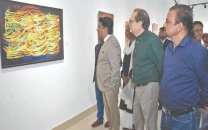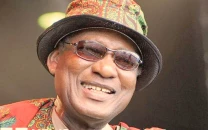Missing melodies: Where did the Pakistani hits go?
Along with booming demand for Bollywood music, blatant piracy has further worsened the situation for local musicians

PHOTO: wallpapercrave
Songs such as ‘Aadat’, ‘Channo’, ‘Tara Jala’, ‘Chaaye Chaaye’ all came out in the mid 2000s.
The artist never dies: Folk maestro’s demise leaves vacuum in Pashto music industry
“During 2005-2006 the music scene was about to take off as every year two to three new artists have massive hits,” says Aaron Haroon Rashid, who has given Pakistan hits like ‘Aye Jawan’ with the band Awaz and ‘Mahbooba’ as a solo artist. “In the past record labels would bid for my songs but when I wanted to release a song in 2010, only one label remained.”
It is not as if new Pakistani singles are not coming out. Awais ‘Wes’ Malik, an RJ on a leading Pakistani radio station, has some startling statistics. “In 2013 around 350 new Pakistani songs were released and in 2014 we had over 600 new Pakistani songs,” he says. So if so many singles are coming out, why does this music receive no traction?
Left to decay
Multiple reasons are attributed to the decay of the Pakistani music industry and interestingly all of them are interlinked. But they all have a common denominator and that is the lack of royalties. “The main source of earning for artists in Pakistan is through concerts and not through content,” claims Hassan, manager of the underground rock band Blackhour. “Whenever a famous musician releases a new song various platforms (such as radio and television) pick the song up from somewhere and play it. So the more their songs are heard, the more they can charge for shows.”
Hence, the first concern is that there are no publishing royalties, which is payment made to artists by such platforms. “Artists spend money to record music and to shoot videos and this material is aired by radios and TV [without incurring any cost],” shares Haroon. “Although these platforms make money via advertising on the back of these artists, they don’t pay them a penny.” And since not all artists are able to book concerts all the time, the lack of financial incentive in the profession puts pressure on artists to find a more sustainable source of income.
As more artists switched over to other dependable professions, the local music industry suffered. There was a lack of fresh music and the airwaves stopped playing older tracks. In order to fill the void left by local content, media platforms turned their attention to Bollywood hits. “The Indians demanded payment for their content and all these platforms, including telecommunication companies that use songs for ringtones, paid millions of rupees for it,” complains Haroon. “So, all that money that could have been pumped into the local music industry began to flow abroad.”
Preserving heritage: Youth carnival kicks off in the city
The demand created by Indian content led to Pakistani artists not getting any airplay or traction. “A typical question that established artists were not being asked was, ‘Itne ursay sey naya gana kyun nahi aya aapka?’ (Why haven’t you come up with any new song recently?),” laments Haroon. Although in reality the artist might have released a new song just a month back, people wouldn’t know about it. “It’s all about Indian songs now,” says Haroon, who added that people had absolutely no idea when he released ‘Ghoom Ghoom’ in 2010 due to lack of airplay.
Along with the booming demand for Bollywood music, blatant piracy has further worsened the situation for local musicians. The decline of physical sales has led to almost all music labels declaring bankruptcy.
The country’s security situation has also been a major concern for musicians. Haroon claims this has led to a 60%-70% decrease in concerts, which is the main source of income for most artists. Malik shares the same concern, “The poor law and order situation and extremism has resulted in artists ceasing to perform commercial concerts. Today, NOC’s aren’t given for large-scale concerts due to safety fears for large gatherings.”
Fixing broken chords
The pressing question today is: How is it that our broadcasters are willingly to pay for foreign content, but balk at the prospect of doing the same for local content? Awais Malik thinks this is largely due to the culture of not paying to watch any kind performance art. “Pakistan could benefit from working models like iTunes and Spotify,” he suggests. Although Pakistanis have been introduced to music streaming platforms such as Patari and Taazi that offer a share of the revenues (around 40% to 70%) to musicians who sign up with them, Malik says, “There is a small revival but it’s too small to sustain an industry.”
Even the Intellectual Property Organization of Pakistan (IPO) has acknowledged the severity of the situation. “We have launched an initiative called the Collective Organization for Music Rights of Pakistan (COMP) that will collect royalties for everyone,” says IPO director Meesaq Arif. “COMP has to submit a tariff schedule which will be approved by the copyright board.”
Founder of COMP, Umer Sheikh, further elaborates the function of the organisation. “COMP is a performing rights society, formed under the directive and mandate of the IPO,” he explains. “Our main function is to seek just compensation from users who utilise the intellectual property created by our members,” he adds.
Sheikh reveals in January 2014 the organisation made some headway when Pakistan Broadcasting Association agreed to sign a blanket license on tariffs with COMP on behalf of FM channels, and with a commitment that the TV channels would follow suit. “They have not signed the actual agreement as yet, but we are working towards a closure,” he shares.
Music, art unite India and Pakistan: Tagore
Both Haroon and Sheikh assert the increasing volume of foreign content is against PEMRA rules as well. As per the PEMRA Ordinance 2002 clause 20(e) broadcasters can play foreign content for no more than 10% of the airtime. “This issue has been raised to PEMRA,” says IPO Director Meesaq.
PEMRA’s clause 20(g) also prohibits broadcasters from airing programmes that violate copyrights, but little attention has been paid to this by broadcasters who continue to rake in money at the expense of musicians.
COMP would not have been possible without the support of IPO and All Music Pakistan Performers Society (AMPPS) cofounded by Ali Azmat and Haroon, says Sheikh. “The fight is not worth an individual artist’s time,” says Haroon. “The industry will squash an individual or group. You need a collective organisation like COMP that approaches platforms and tells them that they need to pay all artists, local and foreign, or they get zero content.”
The sound of reason
Despite collective efforts to revive the music industry in Pakistan, some musicians are complacent with having their music aired for free. “Some don’t care about copyrights and safeguarding their work in order to become mainstream artists, and then they cash in on their popularity,” says Blackhour manager Hassan. He further reveals there is a general lack of awareness regarding copyrights among musicians. “We don’t know about intellectual property laws and many aren’t bothered enough to try and understand it,” he asserts.
Haroon learnt the importance of copyrights when he signed up for a non-profit organisation in the UK called Performing Rights Society (PRS) and received a cheque for a large sum for the airplay his songs received in England.
“Copyright means ownership over any intellectually generated content, that the creator of that particular entity enjoys,” explains Sheikh. According to him the Copyright Act of Pakistan 1962 is quite robust, but there are several areas that require modifications. Although the bulk of the law grants reasonable control to copyright owners, it is important to clear some misconceptions.
“The minute you launch a CD your song is automatically copyrighted, this is called poor man’s copyright,” says Haroon. “In the US people would record their songs on a cassette and mail it to themselves. The stamp acted as proof of the date of recording,” he elaborates. Nadia Shah from IPO confirms this. “Pakistan is a signatory to the Bern Convention, so even if you don’t have legal backing, you can stop copyright infringement by proving you came up with the artistic work yourself,” she says.
Contrary to popular belief, getting a copyright is quite easy. “One needs to apply at the relevant offices in Karachi and Lahore,” says Sheikh. “Provided the documentation is complete, a certificate is usually awarded within three weeks. But it can also take up to three months sometimes as they need to consult and carry out due diligence before issuing a certificate,” he explains, adding that it costs Rs1,500-Rs2,000 to copyright a song which is far less than the rate of $35-$55 charged per song internationally. “But a copyright remains in force for 50 years subsequent to first manifestation and cannot be transferred to the next of kin unlike royalties,” he clarifies.
New direction: Theatre training, folk music sessions on the cards for youth
But most upcoming musicians avoid getting legal cover as there has been no precedent for litigation when the copyright is violated, shares Hassan. But Sheikh disagrees, insisting litigation should not be the motive behind copyright or intellectual property disputes. “It is indeed a crime to use someone else’s property, so why not seek a license and keep matters legal” he urges. “Worldwide it is generally advised that matters of infringement should be resolved outside the court. If matters do come to court and infringement is proven, then the copyright owner can and do seek substantial damages,” he shares.
“People like Praveen Shakir and Faiza Ahmed Faiz could have led lives like JK Rowling if the concepts of licensing and copyrights were applicable in their time and singers such as Mehdi Hasan wouldn’t have died paupers,” IPO’s deputy director law Nadia Shah sums up.
Ans Khurram is a freelance writer.



















COMMENTS
Comments are moderated and generally will be posted if they are on-topic and not abusive.
For more information, please see our Comments FAQ